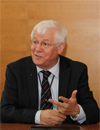 |
||
|
New Drug Could Protect From Radiation Exposure Ц Report RIA Novosti, PUBLISHED 15.05.2014 A team of scientists say they have developed a new drug that could potentially save the lives of those exposed to high levels of radiation, such as in a nuclear accident, according to the journal Science Translational Medicine. In a new study, researchers at Stanford University tested a class of small molecule drugs, known as PHD inhibitors, on mice exposed to toxic amounts of radiation and the drugs protected the animals from radiation-induced gastrointestinal syndrome, which usually leads to death within two weeks. "What we're accomplishing with DMOG is that we're modifying the physiology of the normal tissue to give it time to repair and regenerate," said Giaccia, a professor of radiation oncology at Stanford. Topics: Safety Other news: Hungary Enacts Law to Expand Nuclear Power With Russian Aid HungaryТs president has signed a bill into law to expand a nuclear power plant in the country with Russian assistance. Hungary Lawmakers OK Russia Nuclear Plant Deal Russia will provide Hungary a loan of up to 10 billion euros ($13.5 billion) - around 80 percent of construction costs. Russia to Lend Hungary $13.7Bln for Nuclear Plant The deal was announced during a state visit to Moscow by Hungarian Prime Minister Viktor Orban and was hailed by Russian President Vladimir Putin. |
Hero of the day 
We are currently working with the Nuclear Decommissioning Authority (NDA) on this approach, which was submitted in response to their February 2012 call for alternative proposals. We appreciate that the UK is in the early stages of their policy development activities and are pleased to be involved in such important work. INTERVIEW
Yanko Yanev OPINION
Joint Plan of Action |

